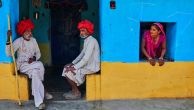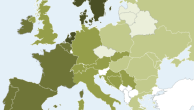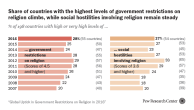This report was produced by Pew Research Center as part of the Pew-Templeton Global Religious Future project, which analyzes religious change and its impact on societies around the world. Funding for the Global Religious Futures project comes from The Pew Charitable Trusts and the John Templeton Foundation.
This report is a collaborative effort based on the input and analysis of the following individuals:
Primary Researchers
Neha Sahgal, Associate Director of Research Alan Cooperman, Director of Religion Research
Research Team
Scott Gardner, Senior Researcher Katie Simmons, Associate Director of Research Steve Schwarzer, Senior Research Methodologist Ariana Monique Salazar, Research Analyst Jonathan Evans, Research Analyst Kelsey Jo Starr, Research Assistant Danielle Cuddington, Research Analyst Conrad Hackett, Associate Director of Research Anne Fengyan Shi, Senior Researcher Stephanie Kramer, Research Associate Juan Carlos Esparza Ochoa, Data Manager Claire Gecewicz, Research Analyst
Editorial and Graphic Design
Michael Lipka, Senior Editor Jeff Diamant, Senior Writer/Editor Aleksandra Sandstrom, Copy Editor Bill Webster, Information Graphics Designer
Communications and Web Publishing
Stacy Rosenberg, Associate Director of Digital Travis Mitchell, Digital Producer Anna Schiller, Communications Manager Jessica Pumphrey, Communications Associate
Others at Pew Research Center who provided research guidance include Michael Dimock, James Bell, Claudia Deane and Gregory A. Smith.
Former Pew Research Center staff members who worked on this study were Jill Carle, Juan Carlos Donoso, Fatima Ghani, Sandra Stencel, Angelina E. Theodorou and Gijs van Houten.
Pew Research Center received valuable advice on the questionnaire for this project from a panel of expert advisers: George E. Demacopoulos, professor of theology and co-director of the Orthodox Christian Studies Center at Fordham University; Kathleen A. Frankovic, election and polling consultant; Lucien N. Leustean, reader in politics and international relations at Aston University; Irina Papkova, research fellow at the Berkley Center for Religion, Peace, and World Affairs at Georgetown University; Victor Roudometof, associate professor of sociology at the University of Cyprus; and Catherine Wanner, professor of history, anthropology and religious studies at The Pennsylvania State University.
Additional guidance for this report came from: Peter F. Crossing, data analyst at the Center for the Study of Global Christianity at Gordon-Conwell Theological Seminary; George E. Demacopoulos, professor of theology and co-director of the Orthodox Christian Studies Center at Fordham University; Fr. Daniel Findikyan, professor of liturgical studies at St. Nersess Armenian Seminary; Francis Githieya, assistant professor of theology and religion at Saint Leo University; Jörg Haustein, senior lecturer in religions in Africa at the University of London; Todd M. Johnson, director at the Center for the Study of Global Christianity at Gordon-Conwell Theological Seminary; Alexei Krindatch, research coordinator at the Assembly of Orthodox Bishops of the United States of America; Ralph Lee, research associate at the Centre of World Christianity at the University of London; Fr. Simeon Odabashian, diocesan vicar for the Armenian Church’s Eastern Diocese of America; the Rev. Ronald Roberson, associate director of the staff of the Secretariat of Ecumenical and Interreligious Affairs at the U.S. Conference of Catholic Bishops; Fr. Luke A. Veronis, director for the Missions Institute of Orthodox Christianity at Hellenic College Holy Cross Greek Orthodox School of Theology; and Gina A. Zurlo, assistant director at the Center for the Study of Global Christianity at Gordon-Conwell Theological Seminary.
Fieldwork for the survey was carried out by Ipsos MORI in Greece, Serbia, Romania, Bulgaria, Poland, Croatia, Lithuania, Hungary, Estonia, Bosnia and the Czech Republic; the Institute for Comparative Social Research Ltd. (CESSI) in Kazakhstan, Moldova, Georgia, Ukraine, Belarus, Russia and Latvia; the Georgian Opinion Research Business International (GORBI) in Armenia; Abt SRBI, Social Science Research Solutions (SSRS) and Princeton Survey Research Associates International (PSRAI) and in the U.S. PSRAI also carried out fieldwork in Ethiopia.
While the analysis for this report was guided by our consultations with the advisers, Pew Research Center is solely responsible for the interpretation and reporting of the data.




